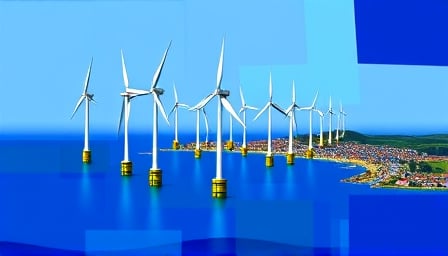Dajin Heavy Industry Co Ltd: A Strategic Leap in Offshore Wind Energy
In a significant development for the renewable energy sector, Dajin Heavy Industry Co Ltd, a prominent player in the electrical equipment industry, has recently signed a substantial contract worth approximately 4.3 billion yuan for offshore wind turbine foundations. This contract, announced on July 21, 2025, marks a pivotal moment for the company, which is listed on the Shenzhen Stock Exchange and specializes in manufacturing wind power equipment, including wind turbine frames and offshore wind turbine infrastructure.
The contract, executed by Dajin’s wholly-owned subsidiary, Penglai Dajin Ocean Heavy Industry Co., Ltd., with a leading European energy enterprise, underscores the company’s expanding footprint in the global renewable energy market. The project, located in Europe, is slated for delivery in 2026, with the contract accounting for about 11.38% of Dajin’s 2024 audited business revenue. This strategic move not only highlights Dajin’s capability in fulfilling large-scale international projects but also its commitment to contributing to the global transition towards sustainable energy sources.
Financial Overview and Market Position
As of July 17, 2025, Dajin Heavy Industry’s stock closed at 32.47 CNH, with a 52-week high of 34.95 CNH and a low of 17.26 CNH. The company boasts a market capitalization of 206.8 billion CNH, with a price-to-earnings ratio of 31.87. These figures reflect the company’s robust financial health and its investors’ confidence in its growth trajectory, particularly in the renewable energy sector.
Strategic Implications and Future Outlook
The offshore wind energy contract is expected to have a positive impact on Dajin’s 2026 business performance. However, the long implementation cycle and the fact that the project is settled in foreign currency introduce a degree of uncertainty regarding the final revenue amount and timing. Despite these challenges, the deal is a testament to Dajin’s strategic positioning and its ability to secure significant projects with major global players in the energy sector.
In the broader context, the renewable energy industry is witnessing a structural investment opportunity, driven by the rapid development of AI and the emergence of new industries such as AI data centers, intelligent driving, and embodied intelligence. Dajin’s foray into offshore wind energy aligns with these trends, positioning the company to capitalize on the growing demand for renewable energy infrastructure.
Conclusion
Dajin Heavy Industry Co Ltd’s recent contract for offshore wind turbine foundations is a clear indicator of the company’s strategic direction and its commitment to playing a significant role in the global renewable energy landscape. With a solid financial foundation and a clear focus on high-growth sectors, Dajin is well-positioned to navigate the challenges and opportunities that lie ahead in the renewable energy domain. As the world continues to shift towards sustainable energy sources, Dajin’s expertise in wind power equipment manufacturing will undoubtedly be a critical asset in meeting the increasing demand for renewable energy infrastructure.
